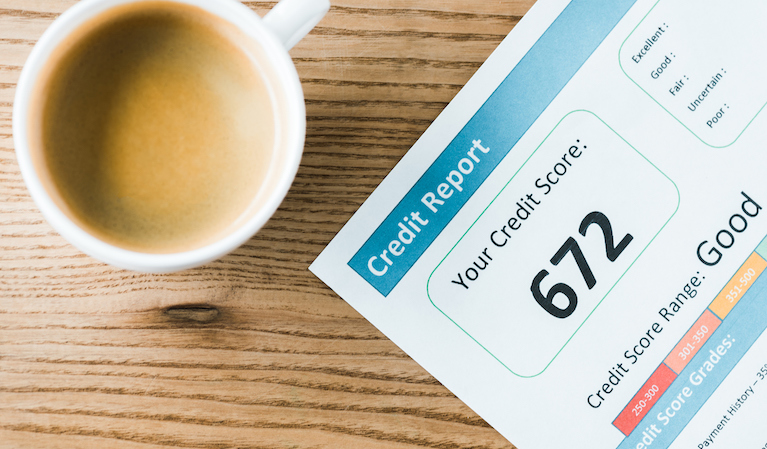If you have bad credit it can feel like a life sentence on your finances. Bad credit means that events in your credit history indicate that you could be a risk to lend to, so it can become an obstacle to you taking out new loans or other financial agreements.
You can drift into bad credit for all kinds of reasons. And once you are there, it is very difficult to know which way to turn to get out of it.
In this article we take a look at how long your bad credit is likely to last for, and whether there is anything that you can do to break out of it.
What causes bad credit?
Bad credit is when you have a poor credit score on your credit report. In the UK there are three Credit Reporting Agencies (CRAs) : Experian, TransUnion or Equifax. Their role is to gather current and past financial information about you and create a credit report on you.
The information in your credit report is then used to predict how reliable you are at handling money. This prediction is a 3-digit number known as your credit score, and lenders will use this as part of their decision-making process as to whether or not to lend to you.
There are a number of things that can have a negative impact on your credit score and cause you to have bad credit. Some of the main ones are:
- Missed or late payments. This can apply to payments of your mortgage, domestic bills, loans or credit cards. Even if you have now paid off the debt, the fact that you missed payments or were late with them, can impact your credit score.
- Hard credit searches. Every time you apply for credit – for example a loan or credit card – the lender will conduct what is known as a hard search on your credit report. If you apply for a lot of credit in a short space of time, or if you have various credit applications rejected, this will reduce your credit score.
- Debt Management Plan (DMP). A DMP is an arrangement to repay unsecured lending – for example loans, credit cards and overdraft – in affordable monthly payments. It will stay on your credit report and affect your credit score.
- Individual Voluntary Arrangement (IVA). An IVA is a way to freeze your debt so that it does not incur any further interest. You can then pay back a fixed amount every month. An IVA will stay on your credit report and affect your credit score even if you have repaid the debt.
- A County Court Judgement (CCJ). A CCJ is a court order that orders you to pay what you owe to a lender. A CCJ will stay on your credit report and decrease your credit score whether or not you repay the original debt.
- Bankruptcy. Declaring yourself bankrupt – or having a lender take you to court and declare you bankrupt – will have a serious impact on your credit score.
- Repossession. Repossession occurs when you are no longer able to pay your mortgage and the lender reclaims the property to get back the money they are owed. A repossession will stay on your credit report and impact your credit score.
How to recover from bad credit
Unfortunately, negative financial information about you – including the factors we have listed above – can stay on your credit report for 6-7 years. This can make it difficult to take out new lending even if you are now in a better financial situation.
Whilst you can’t change what is already on your credit report, there are a few things that you can do to start rebuilding your credit score, even with the bad credit information that still exists.
Here are five things to try:
Make sure your personal identity information is up to date
It is important for CRA’s, lenders and other financial organisations to be able to verify your identity. So make sure that you keep your personal identity information up to date. This means notifying any change of address to organisations such as:
- DVLA – for driving licence and vehicle registration documents;
- DWP – for benefits and pensions;
- HMRC – for tax;
- NHS – for medical records;
- Your employer;
- Your local council;
- Your bank and any other financial organisations;
- The electoral roll – you can register on the Gov UK website.
Check your credit report for errors
It’s also important to check your credit report for errors and contact the CRA if there is anything wrong. Also make sure that the report does not show you as having financial links to anyone else – for example a family member or ex-partner- if this is no longer the case. If that person has a poor credit score, this could drag down your credit score too.
Keep up to date with all existing payments
One key factor in recovering from bad credit is to pay all your current bills on time. Whether it’s mortgage, rent, Council Tax, other domestic bills, loans and credit cards, make sure they are all paid promptly. If possible, set up direct debits so that everything is paid automatically and there is no danger of you forgetting.
Stay below your credit limit
If you have debts, work constantly at reducing them and if possible try not to use more than 25-30% of your current available credit. So for example if you have a credit card with an available balance of £1000, you should try to keep the balance under £300. If you are constantly close to the £1000 limit, this is a red flag to lenders that you should not take on further debt.
Take out a new affordable loan
This may seem to contradict what we have just looked at in terms of staying below your credit limit, but it can also help to build your credit score if you take out a new personal loan. If there is no recent evidence of you handling credit, this can actually work against you in terms of your credit score, as lenders like to see that you are now able to manage money and make repayments.
First things first : you need to be absolutely sure that a new loan is affordable for you. Otherwise you risk slipping back into debt that you can’t handle. But a small loan that you know you can manage well may help to rebuild your credit score.
It’s important to do your research before you apply for a loan, because as we saw earlier, lenders will conduct a hard credit search on you which will appear on your credit report. So look for a lender that offers loans for bad credit and is willing to lend to you on the basis of your current financial situation rather than the past.
If you take out personal loans and manage it well, this information is shared with the CRAs, and your credit score will start to improve.
We hope that the above information is a helpful guide as to how long bad credit lasts, and what you can do to help improve your credit score. And if you are interested in taking out a new loan as part of this process, check out our Bad Credit Loans page to see how we may be able to help.
For more helpful financial and lifestyle tips, visit us here again soon at Loans 2 Go.


 Get your car winter-ready; top tips for safe journeys
Get your car winter-ready; top tips for safe journeys 
















